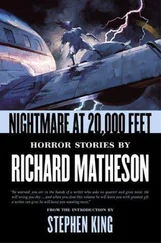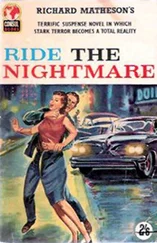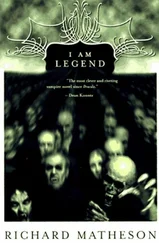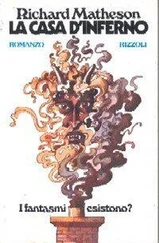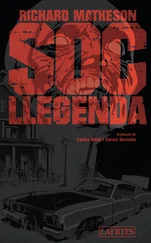Don’t give it back in kind, Bob told himself. Stay cool.
“It means… it’s a matter of opinion. It’s more a label than a definitive identification. By and large, all the absolutist judgments about who’s evil and who isn’t come from laws and courts, politicians, religious figures. They declare that someone—or something—is evil and the majority of the people buy it. They’ve been brainwashed.”
“So what do you think evil is?” Doug asked. “What have you been brainwashed to think?”
“Well, I hope it isn’t having been brainwashed. I hope it’s a rational decision on my part.”
“Which is—?” Doug demanded.
“Which is that pain and suffering, deliberately inflicted for no acceptable reason, is evil.”
“That’s it?” Was that disdainful smile on Doug’s face again? “Pain and suffering inflicted for no reason, that’s evil?”
“That’s my opinion, anyway,” Bob said.
“Well, my opinion is that someday—I’m convinced of it—evil people will all be explained away in terms of heredity and environment, period. The word ‘evil’ will be scrapped. ‘Evil’ people will all be called dysfunctional people, nothing more.”
“Possible,” Bob said. “An interesting notion, anyway.”
“Tell me this—” Doug started. Bob was relieved to hear that Doug sounded interested now, not just scornful. “Why are evil people more interesting than good people?”
“Good question,” Bob answered. “I don’t really know. Except that they arouse more dark reactions in people than good people do. They… how shall I put it… stir up… activate whatever deep-seated, negative emotions people have. And those emotions are more… colorful, you might say. More intriguing.”
“Damn right,” Doug said. “I’ve played good guys and bad guys in films and on television. Guess who audiences always— always —find more interesting?”
“Well, of course,” Bob said. “Who do audiences find more interesting? Hamlet or Richard the Third? Romeo or Macbeth? Othello or Iago?”
“No contest,” Doug agreed. He was really into the discussion now, Bob saw—and thank God for that. “I played Iago in a little theater once and I’ll tell you, he was the one the audience responded to, not that—goddamn moonstruck Moor.”
Bob heard Doug moving and glanced around, seeing Doug’s dark shadow raised on one elbow. He was really into it—and definitely thank God for it. Maybe they could spend the remaining days in stimulating discussions and avoid the other stuff, the friction-laden stuff.
“Audiences like to call these people ‘evil,’” Doug went on, “but they enjoy the hell out of watching them. They relish all their monstrous deeds but convince themselves that those ‘evil’ people are different from them—even though they’re not. They’re all hypocrites, pretending to be above the villains they love to watch. And they’re not.”
Bob was impressed by Doug’s insight; it had come unexpectedly. Maybe the next few days would really be interesting after all.
“You know what I don’t like about your so-called philosophy of life?” Doug said.
So-called, Bob thought. They weren’t out of the personal woods yet. “What?” he asked.
“I don’t believe in an outside system of justice and law,” Doug said. “I believe that will—individual will—is what counts in this world. Triumph of the Will that film was called by that German actress. Not that I’m defending Hitler, for Christ’s sake. You want evil, there you got it, big time. But it’s evolution, not divine law. Survival of the fittest. The strong win. The weak lose. Simple as that. As far as our so-called system of morality goes, it isn’t written in stone. It’s an agreement. A contract. And those who are strong enough to break that contract get away with it until somebody stronger puts them down.”
“But no—outside rule?” Bob said. “No higher imposition of justice?”
“Right,” Doug said. “You know what the Holocaust was? Political reality. Nothing more. Imposition of will. The Germans won, the Jews lost. Evil had nothing to do with it.”
Bob felt his skin goose-fleshing. “You really believe that?” he asked. “You don’t think it was evil? You think it was just a matter of political reality, political will?”
“You got it,” Doug said.
Oh, Jesus, Bob thought. The prospect of interesting discussions in the next few days had just collapsed like a house of cards in a high wind.
“Too bad Hitler was a maniac,” Doug went on. “With his power of will, he could have accomplished anything.”
“He did enough,” Bob said quietly.
“Sure as hell did,” Doug answered. “Conquered most of Europe. If he hadn’t made the same dumb-ass mistake as Napoleon and invaded Russia, he might well have won the war and our fucking national anthem would be—” Abruptly, Doug sang, “ Deutschland, Deutschland, Uber Alles,” then laughed sardonically. Oh, God, Bob thought. Who am I out here with?
“Not so crazy about the Jews myself,” Doug said. “After all the shit I’ve gone through with them in the business.”
Oh, God, dear God, Bob thought.
“All right, look at me,” Doug said. What was he going into now? Bob wondered. “If I did evil things, wouldn’t people say, ‘Well, it was all because his old man was a boozer and beat the shit out of his son and hated everything in the world and that’s why Douglas Crowley is an evil son of a bitch.’”
“I don’t believe you’re evil,” Bob told him, aware of a certain lack of conviction in his voice.
“Well, that’s where you’re wrong,” Doug said. “Didn’t you know I brought you up here to kill you?”
Bob had never felt so cold so quickly in his life. He could not repress a convulsive shiver. “That’s not very funny,” he said.
“Oh, I wouldn’t just do it,” Doug said. “I’d give you a good head start, and if you reached the cabin before I caught up with you, I’d let you live. Otherwise—”
“For Christ’s sake, Doug,” Bob broke in. “Haven’t we had enough friction without you—”
“Oh, you think I’m kidding,” Doug interrupted. “Bobby boy, I’m not.”
Bob felt his stomach muscles spasming. He couldn’t speak. Dear God. It was all he could think.
He started at the sudden glare of Doug’s flashlight.
Doug laughed, sounding delighted. “Just wanted to see the look on your face,” he said. “I can see you really believed me.”
Bob exhaled shakily, averting his face. “For Christ’s sake,” he said. “Why did you do that?”
“Did I scare you, Bobby boy?”
“Of course you scared me. What do you think?” Bob shuddered. Jesus Christ, he thought.
“It was just a joke,” Doug told him.
“Some joke.”
Bob gasped as Doug grabbed him by the arm. “But I really meant it!” Doug cried.
Bob gaped at him. Doug was silent for a moment, then threw back his head, laughing raucously. “Oh, shit, you’re too easy to fool,” he said. Letting go of Bob’s arm, he switched off the flashlight and lay back down. “Good night, old boy,” he said.
Bob lay motionless, feeling the heavy, rapid beat of his heart. For God’s sake, he thought. What kind of man was Doug that he could do such a thing?
Despite the exhaustion, it took him more than an hour to fall asleep.
Bob twisted around in his sleeping bag. His right arm had come out of the bag and it flopped over to where he believed Doug was sleeping.
His arm hit the ground. His eyes popped open and he looked around uneasily, suddenly wide awake.
Sitting up, he leaned over and drew back the tent flap. Doug was hunched over by the low-burning fire, staring into the coals.
Читать дальше


